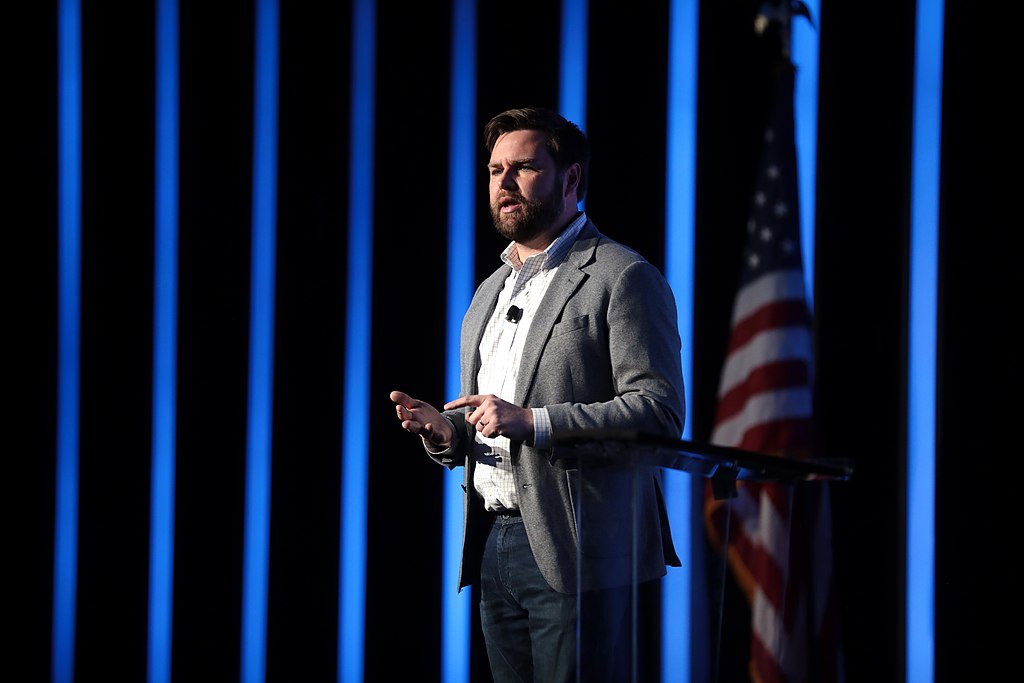
Perhaps in a pre-Trump political landscape, J.D. Vance’s campaign for Ohio’s vacant U.S. Senate seat could have focused on the dissolution of the state’s local communities and lackluster economy.
Alas, this world is not that landscape.
Instead, Vance’s longshot campaign has centered on culture war fodder and melodramatic tweets about the dangers of visiting New York City and nonsense about illegal immigrants run amok.
A campaign that could have had a vision for how to Make Ohio Great Again has stuck to the familiar national platform of culture war rabble-rousing and outrage. But why?
In a nutshell: It’s what voters want and what the public rewards the media for covering. For charismatic public figures and pundits, this shift is great. They get attention and support without solving problems. For rural areas, states with weak economies, and struggling people, this shift is a disaster. Politicians are less accountable for getting results, and localism—a traditional strength of the American political system—has weakened. No one is dealing with local problems, obsessing over the abstract issues they can’t control instead of the concrete problems in front of them.
The problem is not only J.D. Vance or Donald Trump. The problem extends to Republicans and Democrats alike. The nationalization of politics, where even local and state elections center on national issues, means that when one place’s problems don’t fit into a national narrative, they get ignored.
Vance’s election strategy is all the more strange because he already had a strong pitch for a local or state race. It’s not as if he didn’t offer a conservative perspective that wasn’t fresh or couldn’t find organic support in Ohio. Hillbilly Elegy went viral from an interview Vance did with journalist Rod Dreher of the American Conservative in July 2016, and he was much more critical of Donald Trump and Republicans than he is today.
Vance criticized a Republican Party that ignored its base for its wealthy donors:
From the Right, they’ve gotten the basic Republican policy platform of tax cuts, free trade, deregulation, and paeans to the noble businessman and economic growth. Whatever the merits of better tax policy and growth (and I believe there are many), the simple fact is that these policies have done little to address a very real social crisis.
Vance also understood why voters liked Trump: “What does it mean for our politics? To me, this [elite] condescension is a big part of Trump’s appeal. He’s the one politician who actively fights elite sensibilities, whether they’re good or bad…If nothing else, Trump does that.”
Understanding Trump’s anti-elite appeal, the Vance candidacy could have recognized the dignity of average Americans and done some good for Ohio. His 2019 speech at the American Conservative’s gala, “Towards a Pro-Worker, Pro-Family Conservatism,” outlines a political approach that even some left-leaning types could get behind. Unfortunately, the strategy he now uses, and the talking points he parrots, don’t reflect much of his previous insights.
His platform isn’t all that different from traditional Republican concerns about border security, defending small businesses, and restoring American manufacturing, but his media appearance and Twitter is more bombastic to the point of parody. “Combat drug and opioid epidemic” comes after “dismantle big tech oligarchy,” and barely gets more words (120 vs 111) in his platform—even though his gala speech noted 70,000 people died from opioids. As overbearing and foolish as the people at Facebook, Google, and Twitter can be, they’re not as big a problem for Ohioans as drug addictions that destroy families.
Vance probably won’t win the election (he’s also not the worst candidate out there—just look at Josh Mandel). But Vance’s attempt is a missed opportunity to focus on what ails Ohio.
The middle class and too many families struggle in the state. They’re the ones who need leaders who have a vision for the future, who see the latent opportunity in the Buckeye State, and will work to revive it. Southern Ohio is lagging just like the Rust Belt cities in the northeast, but most state politicians want power without the responsibility to help the people who gave it to them.
So what does J.D. Vance’s candidacy mean for Ohio, for Appalachia, and for conservatism? Even as the intellectuals argue over free trade and the economic changes of recent decades, elections will still focus on culture war.
Politicians and pundits will stay obsessed with national issues, which means that elections throughout the Midwest and Appalachia won’t focus on the concrete concerns of locals. Instead, they will center on outrage-topics that drum up noise and thunder.
That’s a shame, and it’s a bigger problem than Vance. It takes sympathy and honesty to talk about the future of Ohio, a deindustrialized state of 11.8 million, barely growing from its 2010 population of 11.5 million, with a drug problem, a middling economy, and ambitious young people leaving its borders. The rural-urban divide hasn’t spared it, and the gains that do get made pile up in its cities. Rural residents lose political and cultural power. Few mayors and governors, inside Ohio or out, take these issues seriously.
No matter Vance’s fate, the political tenor in Appalachia and the Midwest will be set by the boisterous and cantankerous. Political consultants want to remake voters in their own image, instead of building political campaigns around the needs of voters.
In his interview with Dreher, Vance showed his insight:
I think that’s the only way to have this conversation and to make the necessary changes: sympathy and honesty. It’s not easy, especially in our politically polarized world, to recognize both the structural and the cultural barriers that so many poor kids face. But I think that if you don’t recognize both, you risk being heartless or condescending, and often both.
Unfortunately, J.D. Vance the candidate shows much less sympathy and honesty than J.D. Vance the writer. Perhaps Vance the writer would have no shot of getting elected, and his attempt wouldn’t do much to improve the noise of politics. If Vance the writer had shown up to Ohio in 2021, though—as irrelevant as Don Quixote striking at windmills—at least then he would have made a plea for the dignity of the masses who are, as usual, overlooked in another Senate election.
Subscribe to The Patch, our newsletter, to stay up-to-date with new expatalachians articles and news from around Appalachia.
Anthony Hennen is managing editor of expatalachians and executive editor of Philadelphia Weekly.

